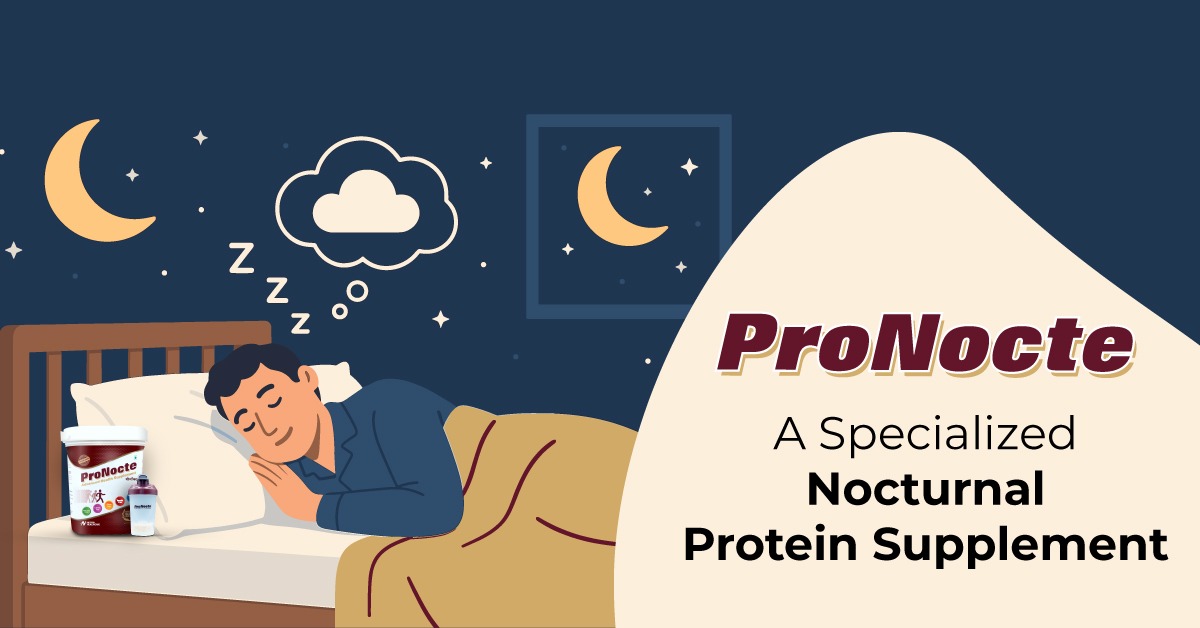


Published On 19 Oct, 2025

Most of us focus on what to eat during the day—breakfast smoothies, protein-packed lunches, or post-workout shakes. But what about nutrition at night? Many people either skip food before bed or worry that eating late leads to weight gain. However, research suggests that nocturnal nutrition, especially protein intake before sleep, can be highly beneficial for muscle recovery, fat metabolism, and overall health.
In fact, one of the most searched questions online is: “Is it good to eat protein at night?” The answer is yes — and in this blog, we’ll dive deep into why protein before bed matters, the science behind it, and how to do it right.
When we sleep, our body is not inactive. It’s actually performing crucial functions:
If you go to bed without sufficient nutrients, your body lacks the building blocks necessary to optimize these processes. That’s why protein intake at night is gaining attention in sports nutrition and wellness communities. It ensures a steady supply of amino acids while you sleep.
1. Muscle Protein Synthesis While Sleeping
Your muscles grow and recover while you sleep, not while you’re in the gym. Consuming slow-digesting protein before bed—like casein—delivers a steady release of amino acids throughout the night. This enhances muscle protein synthesis (MPS) and prevents muscle breakdown.
For athletes, bodybuilders, and even those over 40 (who naturally experience slower muscle recovery), this can be a game-changer.
2. Improved Recovery for Athletes & Gym-Goers
After intense workouts, muscles are inflamed, and micro-tears occur. Protein intake at night provides continuous recovery support. Research has shown that individuals who consume protein before sleep experience:
This is why many professional athletes include a nighttime protein shake as part of their training plan.
3. Supports Metabolism and Fat Loss
A common myth is that “eating at night makes you fat.” In reality, what matters is total daily calorie balance, not meal timing. In fact, studies show that a protein-rich snack before bed may:
For those aiming at weight loss, nighttime protein helps maintain lean muscle mass, which is crucial for long-term fat burning.
Choosing the right protein source is essential. Here are some of the best options:
Tip: Avoid heavy, greasy foods before bed as they may interfere with sleep. Stick to light, protein-focused snacks.
Protein needs vary depending on age, body weight, and activity level. Generally:
Example:
While whole foods and standard protein shakes work, sometimes you need a specialized nighttime formula that’s easy to digest and designed for overnight recovery for the people dealing with Sarcopenia in liver cirrhosis.
Why ProNocte Stands Out:
Myth 1: Eating late at night always causes weight gain.
Truth: Weight gain happens when you consume more calories than you burn — not because you eat at night.
Myth 2: Protein before bed disrupts sleep.
Truth: Protein, especially from dairy, may actually improve sleep since it contains tryptophan, an amino acid that supports melatonin production.
Myth 3: Only athletes need protein at night.
Truth: Even older adults and people aiming for fat loss benefit from nocturnal nutrition.
1. Is protein at night good for weight loss?
Yes. Eating protein before bed helps preserve lean muscle and supports fat metabolism, making weight loss more effective.
2. What is the best protein before bed?
Casein protein powder and cottage cheese are ideal because they digest slowly and fuel the body overnight.
3. Does eating protein before bed build muscle?
Yes. Protein intake at night enhances muscle protein synthesis and boosts recovery, leading to better muscle growth.
4. Can I eat eggs or chicken at night?
Yes. Both are great protein options, but keep the portions moderate to avoid digestive discomfort.
5. How much protein should I eat before bed?
Aim for 20–40 grams, depending on your fitness goals and activity level.
6. Is whey protein good before bed?
Whey digests quickly, so it’s better post-workout. For nighttime, casein is more effective, though whey is still beneficial if that’s what you have.
Nocturnal nutrition is more than just a trend—it’s a proven strategy for better muscle recovery, improved metabolism, and healthier sleep cycles. By making protein intake at night a regular habit, you can maximize the benefits of sleep and wake up stronger, leaner, and more energized.
Whether your goal is muscle growth, fat loss, or general health, don’t just focus on daytime meals—fuel your nights too.
 Disclaimer
DisclaimerProNocte is a health supplement and is not intended to diagnose, treat, cure, or prevent any disease.